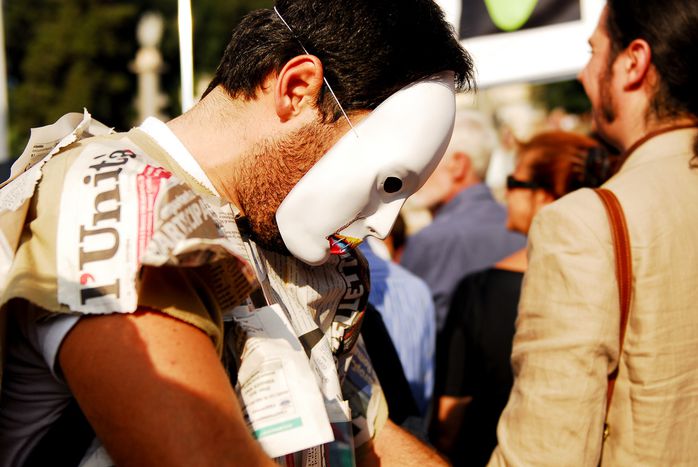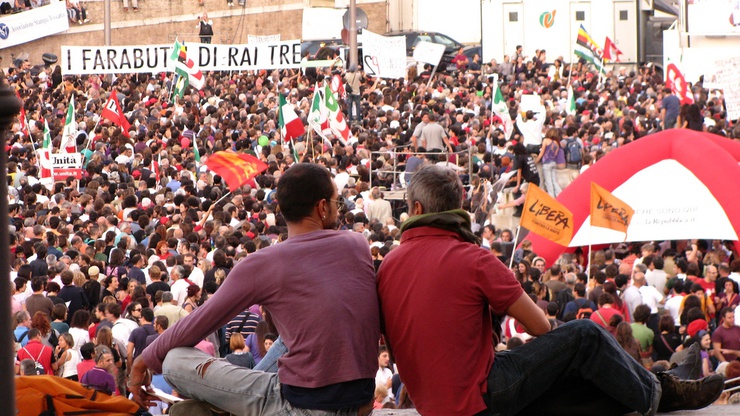
Europe falls in press freedom rankings
Published on
Translation by:
James FrisciaIf the old continent believes it still represents the paradigm of press freedom, then it is in for a rude awakening: in the worldwide rankings of freedom of the press published by Reporters Without Borders, many European nations are in a state of free fall. Yet a defence organises for what Kant called 'freedom of the pen'
Who is the European journalist? What is working in the Old Continent like? No worries if you are within the so-called bastion of free press, the triangle formed by Denmark, Finland and Ireland. That is, unless, you plan to publish sarcastic cartoons depicting religiously-charged subject matter. If you go to Russia instead, journalists need to pay close attention to what they say regarding Georgia or human rights, especially after Anna Politkóvskaya's assassination in 2007. Slovak reporters face similar conditions, due to constant political interference and the introduction of a right to dispute any article in which one plausibly feels they have been offended, criticised or slandered. The rebuttal must be published and any media that refuses to oblige is charged a fine. Let us not forget that in prospective European Union nations, like Croatia, journalists think more than twice before speaking about Serbo-Croatian relations.
Politicans and press freedom
The grounds of press freedom are also collapsing in some of the founding nations of the European Union. According to the 2009 annual Reporters Without Borders report, French journalists have needed to deal with judicial investigations, arrests and political meddling, even via French president Nicolas Sarkozy. The situation is worse in Italy, which is 49th in the global rankings (France is 43rd) of Reporters Without Borders. There are rumblings in the bel paese of intimidation and constant legislative obstruction. In fact, it has not been long since news was made public that Italian prime minister Silvio Berlusconi was being investigated for allegedly pressuring Italian public radio stations into cancelling certain programmes he considered hostile. Nor has much time passed since a freedom of the press rally took place on 3 October 2009, in which hundred of Italians gathered in the centre of Rome. Although we are unaccustomed incidents like these in the 'cradle of civilisation', they are affecting us more than ever.
'It is not just an Italian problem'
'It is not just an Italian problem,' affirms Annemie Neyts-Uyttebroeck, president of ELDR (the European liberal democrats party). 'With the major private television corporation (Mediaset) in the hands of Berlusconi and with his continuing intrusions into public service, Italy is not a case we should discount; however freedom of the press is also coming under fire in countries like Hungary and the United Kingdom. One needs only to consider all the media businesses owned by Rupert Murdoch in the UK - British Sky Broadcasting, The Times, The Sun, to name just a few.

Power, internet and the journalist
The true enemy of press freedom is definitely the consolidation of power. 'There are three types of power: political, economic and media. If political and economic powers are inseparable, there is no doubt that media influence is likewise held by those with economic power. The most dangerous of all is when one holds both media and political power.' This is what Enzo Marzo, one of the founders of the Pannunzio Society, an Italian organisation which works to support the freedom of information, declared during an EDLR-funded seminar on press freedom in Europe on 12 March in Rome.
The internet makes it quite tricky to verify sources’ credibility
The internet might become the panacea for journalists. It is surely not easy to control it, just look at the stories we get from China despite the strict censorship. However, the internet makes it quite tricky to verify sources’ credibility. Keep in mind how the news of the presumed separation of presidential couple Sarkozy-Bruni which spread through twitter was later revealed to be a hoax. Therefore, is it is difficult to guarantee readers authentic information on the web.
And what about journalists? The ideal journalist is courageous, has an open and flexible editor and, above all, has a contract. Nowadays this last one is the hardest to come by. Normally many journalists are becoming incapable of breaking into the editorial hierarchy by only working in freelance or on an ad hoc basis. Moreover, it is generally accepted that one cannot live exclusively from the pen. In short, even though it is just some countries that neglect to control the cancer that is consuming what remains of press freedom, everyone feels the consequences. Accordingly, it is of vital importance to prevent this from happening.
Images: ©Adele Sarno; lo spacciatore di lenti; rsepulveda/ video: RomacittaTV/ Youtube
Translated from Libertà di stampa: le penne europee tremano



